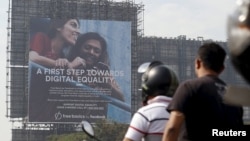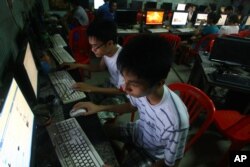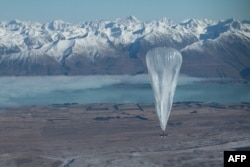By satellite, drone or balloon, tech companies are seeking to connect more of the world's under-served regions to the internet.
But these unconventional strategies come with risks, as demonstrated by a spectacular launch pad explosion earlier this month.
The rocket that blew up Sept. 1 at Cape Canaveral, Florida, was meant to carry a satellite that would help improve internet connectivity in sub-Saharan Africa. The social-media company Facebook planned to use the satellite to expand its free and low-cost services.
Some of those services themselves have been under fire this year.
Free Basics
Facebook's Free Basics service was banned in India in February, following criticism from net-neutrality advocates.
Free Basics offers access to a limited suite of websites — including approved health, education, weather and communications sites and, of course, Facebook — free of data charges to anyone with a smartphone.
When Indian regulators shut it down, they barred service providers from charging different prices for different levels of service. Critics said Facebook should not be a gatekeeper for what part of the internet users can access.
But the service is available in 48 countries in Africa, the Middle East, Asia Pacific and Latin America.
It rolled out in Nigeria in May, where "if you want very good internet, it's very expensive. Usually only big companies and rich people can afford that," said Faiz Bashir, CEO of Abuja-based education technology company FlexiSAF.
FlexiSAF is launching a test-prep service for students on Free Basics. Bashir says his relatives in isolated parts of Nigeria use the service constantly to keep in touch.
"You can actually communicate via WhatsApp, have access to Facebook," he said. "So, there's definitely a large number of people now who have access to free internet from remote locations across the country."
New netizens?
Along with its Express Wi-Fi service, which connects users to a local hotspot for a small fee, Facebook says it has "brought more than 25 million people online [worldwide] who otherwise would not be."
But other research questions how many new users Facebook's Free Basics and other "zero-rated" services are creating.
The advocacy group the Alliance for an Affordable Internet surveyed users of zero-rated services in eight countries. It found that 88 percent of users had been online before.
"People that were using the zero-rated services were not using the internet for the first time," said research manager Dhanaraj Thakur. "What was happening, in fact, was they were using it as a way to manage their costs."
People were using Free Basics to check Facebook, for example, and using their data plans to watch videos.
Any means necessary
While Facebook's satellite explosion was a setback, the company has other plans to bring the internet to underserved areas.
Last month it announced a successful test of a solar-powered drone designed to stay aloft for weeks and bounce internet access to remote areas.
Tech giants are competing to connect the unconnected. Google's Project Loon aims to connect isolated users through a network of huge balloons floating in the stratosphere.
Both projects are years from reality. There is no word yet on whether Facebook plans to try another satellite launch in the meantime.
Facebook had partnered with Paris-based telecommunications company Eutelsat on the satellite that blew up. Eutelsat had planned to deliver broadband internet access to business customers via satellite dish.
The company says it plans to launch its own satellite in 2019.







